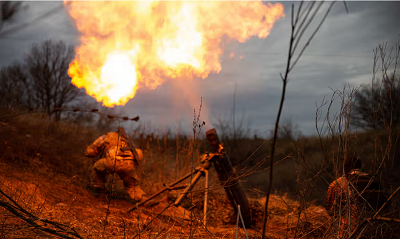Ukraine to change conscription policies in drive to sustain fighting capacity
Changes to include use of commercial recruitment firms to carry out more targeted conscription, say officials
Shaun Walker THE GUARDIAN

The Ukrainian government is planning to change its conscription practices as it seeks to sustain fighting capacity after nearly two years of full-fledged war with Russia.
The changes, expected to be announced this week, will include the use of commercial recruitment companies to carry out more targeted conscription and to reassure conscripts they will be deployed in roles that match their skills and not simply sent to the front, according to one senior official.
“Some people are scared, scared to die, scared to shoot, but it doesn’t mean they can’t be involved in other activities … Now we have a new minister with a new approach,” Oleksiy Danilov, the secretary of Ukraine’s security council, told the Guardian.
In early September, the president, Volodymyr Zelenskiy, sacked Oleksii Reznikov, who had been defence minister since the beginning of the war, and replaced him with Rustem Umerov, who spent the early part of the war working on doomed negotiations with Russia. On Friday, Zelenskiy said he expected Umerov’s ministry to provide him with a package of new mobilisation policies this week.
“The plan will be worked out and all the answers will be there – next week I will see this plan,” Zelenskiy told a news conference, without giving further details.
Danilov said the army would work with two of Ukraine’s biggest recruitment companies in order to identify people with specific skills, and to dissuade skilled Ukrainians who wanted to help the army but did not want to go to the front from trying to evade the draft.
“The mobilisation will become more flexible, those specialities that are required will be announced, and people will be volunteering for a concrete position. For example, they need welders or mechanics and so on,” said Danilov.
A source in the defence ministry confirmed that contracts had been signed with recruitment companies, but did not give any further details. It was not immediately clear how involved the recruitment companies would be in the process, nor at what level general recruitment for frontline work would continue alongside the more targeted process.
Zelenskiy’s announcement comes as Ukraine prepares to face another winter at war, with widespread fatigue at the front and amid society at large. The summer and autumn Ukrainian counteroffensive has failed to win back large amounts of territory, and there are increasing voices among Ukraine’s western partners suggesting in private that sooner or later Kyiv may need to consider attempting a negotiated end to the war.
In the first months of the war, hundreds of thousands of Ukrainians volunteered to fight, as part of a wave of patriotic determination that shocked Russia and repelled its initial advances. But as the war has dragged on, most people who are willing to fight have already signed up, and many of those already at the front are injured or exhausted.
Increasingly, the army has had to turn to mobilisation to fill the ranks. Viral videos have shown men snatched from the street to be conscripted, and there have been numerous corruption scandals of officials taking bribes to provide exemption. In August, Zelenskiy fired every regional recruitment chief.
Once conscripted, recruits get a few weeks of training and can then be sent to the front. Many Ukrainians say if called upon they would go to the army, but many men of conscription age who do not want to be sent to the front have spent weeks or months hiding at home, trying to avoid the roaming squads of mobilisation officers. Many join Telegram groups in which people share tips on where mobilisation officers are working on any given day.
In the summer, sources in Odesa explained a popular scheme in the city, whereby for a fee of $5,000 in cash, men who did not want to serve could receive a fake medical report suggesting serious spinal issues, with which they would be declared exempt from conscription and be allowed to leave the country.
Danilov admitted there was a recruitment issue but said Russian propaganda was exaggerating the scale of the problem. “Russia is trying to heat up this issue, saying that we don’t have enough soldiers, that we have problems with mobilisation … There are always problems in life, let’s not overestimate it,” he said.
